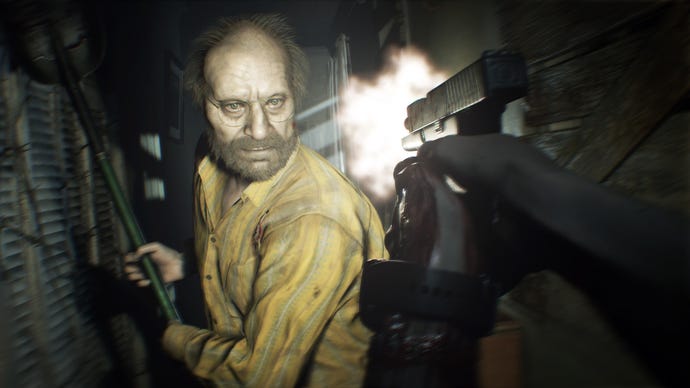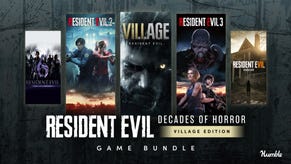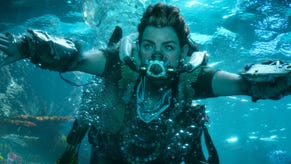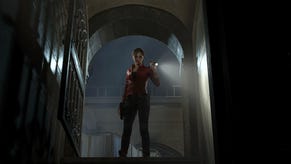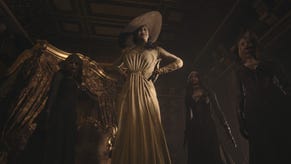Resident Evil Interview: "why should we make something that everyone else is making?"
Resident Evil 7's director and producer talk changing direction, first-person and rebooting a horror classic.
Resident Evil 7 is a risk. While the previous entry in the series had a rough critical reception, let's not pretend it wasn't a success: it was hokey and weird, but it also went on to become Capcom's second best selling game ever. Making a game with the same mad formula would've been the easy way out - but that's not the way Capcom ended up going. That in itself deserves praise - the seventh entry in the series is a very different beast.
Key to the decision to change the series up in a big way was producer Masachika Kawata and director Koshi Nakanishi. When I meet the pair at the end of a whirlwind promotional tour for the game they appear content with their creation but also slightly apprehensive to see how it's received. One thing they are certain on is clear: that this is a change that needed to happen.
The following is around half of my Q&A with the pair. The second half dives into spoiler territory about some of Resident Evil 7's more intriguing twists and turns - we'll publish that a while after the game has launched and after there's been plenty of time for everyone to play it.
VG247: So, I know you've talked about this quite a lot, but I'd love to hear you explain it directly - why this change of direction for the series? Why now?
Masachika Kawata: Well, with Resident Evil 6 I think we'd reached the limit on how far we could go in expanding the scale of a blockbuster style, globetrotting story line with multiple characters and intersecting campaign threads and so forth. We just wanted to stop and take stock of what Resident Evil really meant.
Y'know, you can call it a return to roots, but return makes it sound like we're just looking backward, but we also want to look forward to the future of the series and take this chance to turn the spotlight on a more focused, more intimate scenario.
It's still taking place within the Resident Evil world, but it's kind of a more novel, interesting way of looking at the Resident Evil universe, a different perspective. We also just wanted a chance to take the latest technology available to make a really interesting, modern horror game that made sense for modern gamers and where the market is right now. I think, looking at the finished game now, I'm pretty confident we've been able to achieve our goals.
"You can call it a return to roots, but return makes it sound like we're just looking backward, but we also want to look forward to the future of the series."
You mention perspective there - on that topic, how did first person come about? Was it always the intention, or did that emerge over time?
Koshi Nakanishi: Right from the start of the concept stage of the game, we always thought we were going to make a first person game. A lot of games these days are focusing on the experience and the believability, on the immersiveness of their world... it just seemed to make sense to us that we wanted to have people feel like they're actually jumping into the Resident Evil universe.
First person perspective seemed to be the best way to achieve that, and we stuck with that right from the very start. We never wavered.
One of the things that strikes me is that for a long time Resident Evil was growing and growing in feature set terms. Arcade-style modes, co-operative play... here you've pulled back and really focused on a single player experience. Was having a smaller but denser experience ever a worry?
Koshi Nakanishi: Well, our boss was telling us... why should we make something that everyone else is making, y'know? We've got a great chance here with this horror franchise to make it a really focused experience in single player. It doesn't need all these other things for that experience to succeed - especially because it is traditional horror.
I wouldn't say that at the very start of development we didn't consider... Like, 'are we sure this is something people want nowadays given the trends that were developing in the previous console generation?' But I think ultimately there's definitely, absolutely a market for a game that just does one thing really well rather than trying to be a jack of all trades.
"There's definitely, absolutely a market for a game that just does one thing really well rather than trying to be a jack of all trades."
Masachika Kawata: I think Capcom as a company really tries to stand by its creators whenever they've got an idea that they really want to follow through on. They're not going to throw marketing data at us and say 'You shouldn't make this because people want something else'.
If we're really confident in our concept and we think we can see it through and make a really great game that people want to buy then we don't need to worry too much - we can make it.
From what your question was it sounds like people might expect it would've been difficult for us to get this game made at Capcom, but I don't think it was quite as difficult as people might imagine. The company as a whole is very creative, and has a very healthy attitude to whatever we want to make.
I was surprised by how dense this game is with little details, and that sort of thing is a lot harder to build now than in titles like the first few Resident Evil games. Was that a challenge?
Yeah, it is tough compared to the old days! The amount of assets you have to create is absolutely astronomical compared to the PS1, and of course the resolution and quality of those assets has risen as well. But that's part of the reason we went for our custom RE engine this time.
It's an engine that doesn't just let us create visuals that look photo-realistic and get good performance out of the consoles, but it also has a really great speed of iteration. We can set something up, try it out and quickly fix it up again - our iterative process of development is that much faster with the RE engine that we've actually been able to catch up on some of the time that we spent creating the huge amount of assets needed for a game like this with this level of depth.
